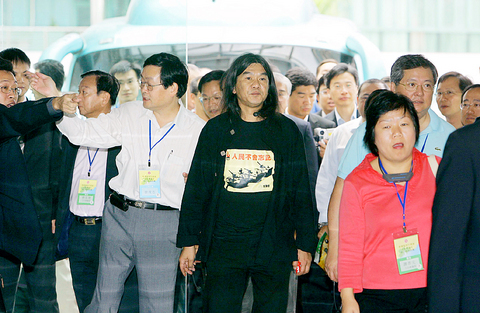In the summers of 2003 and 2004, hundreds of thousands of protesters filled the streets here to call for the direct election of Hong Kong's chief executive and the entire legislature. But the demand was quickly ruled out by the Standing Committee of the National People's Congress, China's rubber-stamp parliament.
Now, with unexpected support from Beijing, the government here is preparing to move a step closer to fully democratic representation with an election plan to be announced next month.
The proposal involves giving a greater role to neighborhood councilors -- most of whom are elected by Hong Kong voters -- in choosing the chief executive and six of the 70 members of Hong Kong's legislature, the chairmen of the three main political parties here said in separate interviews.

PHOTO: AP
All three chairmen voiced qualified support for the outlines of the plan, while saying that they wanted to see the final details.
The two parties that have traditionally backed the Hong Kong government -- the pro-business Liberal Party and the pro-Beijing Democratic Alliance for the Betterment and Progress of Hong Kong, or DAB -- had both advocated more restrictive plans for constitutional changes that would have guaranteed more influence for their politicians.
The government's plan "is not our first choice, but we could live with that," said James Tien (
Ma Lik (
Lee Wing-tat (李永達), the chairman of the Democratic Party, said in an interview last week that depending on the details of the plan, his party might support it. Democracy advocates make up a little more than two-fifths of the legislature, and that gives them a veto for any plan for electoral changes, which require the support of two-thirds of the legislature.
Lee said his party remained concerned that the executive branch, led by Tsang, chooses 102 of the 529 neighborhood councilors in Hong Kong. The appointed members are mostly business leaders who tilt toward Beijing.
The Democratic Party wants the appointed councilors excluded from selecting any members of the legislature or the chief executive; the DAB and the Liberal Party want the appointed councilors included.
Raymond Tam, principal assistant secretary for constitutional affairs, declined to comment on the electoral plan, but he did say that the government intended to move toward "the ultimate aim of universal suffrage in a gradual and orderly manner," and wanted to make the chief executive and legislative council more representative.
In a further attempt to woo democrats, Beijing invited all 60 members of the legislature here to visit nearby Chinese cities yesterday and today. It will be the first time that many pro-democracy lawmakers will have been allowed across the border since the Tiananmen Square killings on June 4, 1989.
There are currently 800 members -- including 42 of the district councilors -- of the Election Committee, which choose the chief executive. Under the new plan, all district councilors would join the Election Committee along with several hundred representatives of business, professional groups and grass-roots organizations, doubling the total membership to 1,600.

PRECARIOUS RELATIONS: Commentators in Saudi Arabia accuse the UAE of growing too bold, backing forces at odds with Saudi interests in various conflicts A Saudi Arabian media campaign targeting the United Arab Emirates (UAE) has deepened the Gulf’s worst row in years, stoking fears of a damaging fall-out in the financial heart of the Middle East. Fiery accusations of rights abuses and betrayal have circulated for weeks in state-run and social media after a brief conflict in Yemen, where Saudi airstrikes quelled an offensive by UAE-backed separatists. The United Arab Emirates is “investing in chaos and supporting secessionists” from Libya to Yemen and the Horn of Africa, Saudi Arabia’s al-Ekhbariya TV charged in a report this week. Such invective has been unheard of

‘TERRORIST ATTACK’: The convoy of Brigadier General Hamdi Shukri resulted in the ‘martyrdom of five of our armed forces,’ the Presidential Leadership Council said A blast targeting the convoy of a Saudi Arabian-backed armed group killed five in Yemen’s southern city of Aden and injured the commander of the government-allied unit, officials said on Wednesday. “The treacherous terrorist attack targeting the convoy of Brigadier General Hamdi Shukri, commander of the Second Giants Brigade, resulted in the martyrdom of five of our armed forces heroes and the injury of three others,” Yemen’s Saudi Arabia-backed Presidential Leadership Council said in a statement published by Yemeni news agency Saba. A security source told reporters that a car bomb on the side of the road in the Ja’awla area in

US President Donald Trump on Saturday warned Canada that if it concludes a trade deal with China, he would impose a 100 percent tariff on all goods coming over the border. Relations between the US and its northern neighbor have been rocky since Trump returned to the White House a year ago, with spats over trade and Canadian Prime Minister Mark Carney decrying a “rupture” in the US-led global order. During a visit to Beijing earlier this month, Carney hailed a “new strategic partnership” with China that resulted in a “preliminary, but landmark trade agreement” to reduce tariffs — but

SCAM CLAMPDOWN: About 130 South Korean scam suspects have been sent home since October last year, and 60 more are still waiting for repatriation Dozens of South Koreans allegedly involved in online scams in Cambodia were yesterday returned to South Korea to face investigations in what was the largest group repatriation of Korean criminal suspects from abroad. The 73 South Korean suspects allegedly scammed fellow Koreans out of 48.6 billion won (US$33 million), South Korea said. Upon arrival in South Korea’s Incheon International Airport aboard a chartered plane, the suspects — 65 men and eight women — were sent to police stations. Local TV footage showed the suspects, in handcuffs and wearing masks, being escorted by police officers and boarding buses. They were among about 260 South